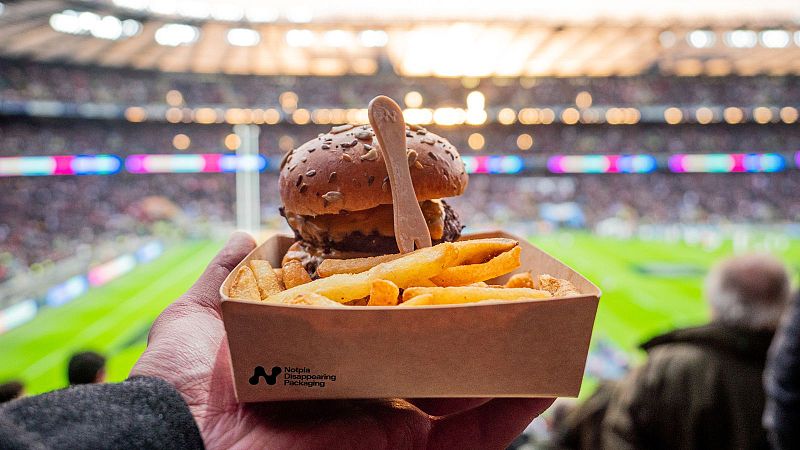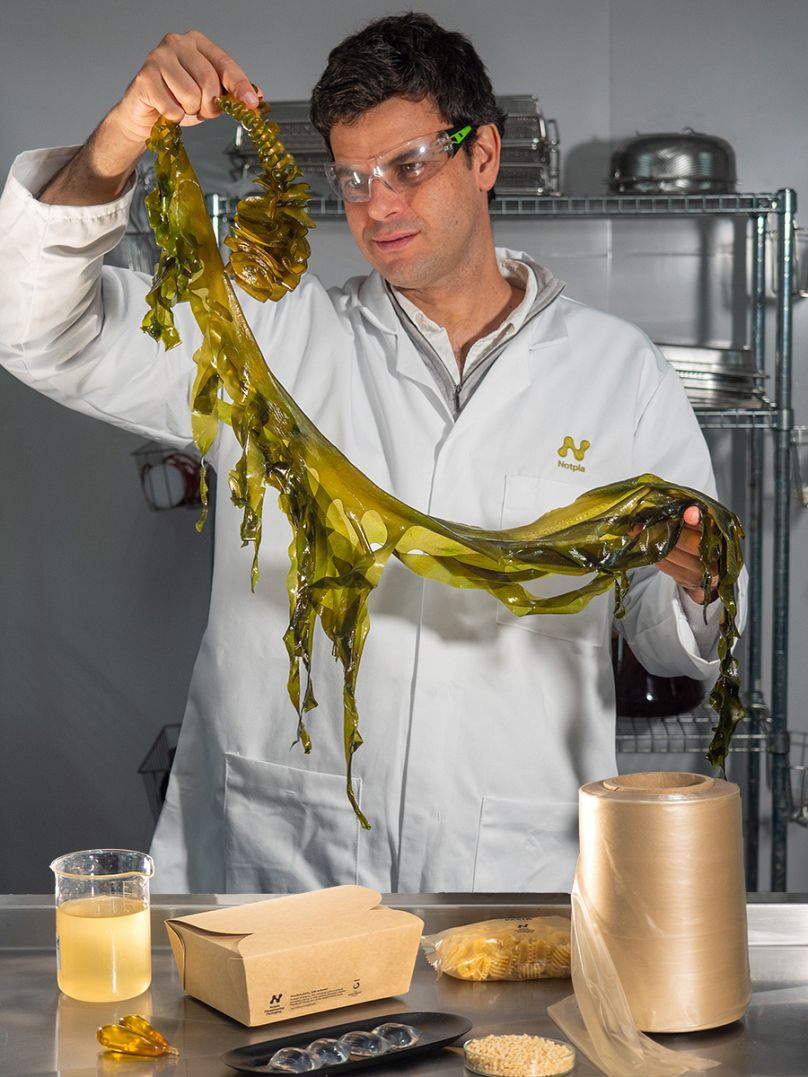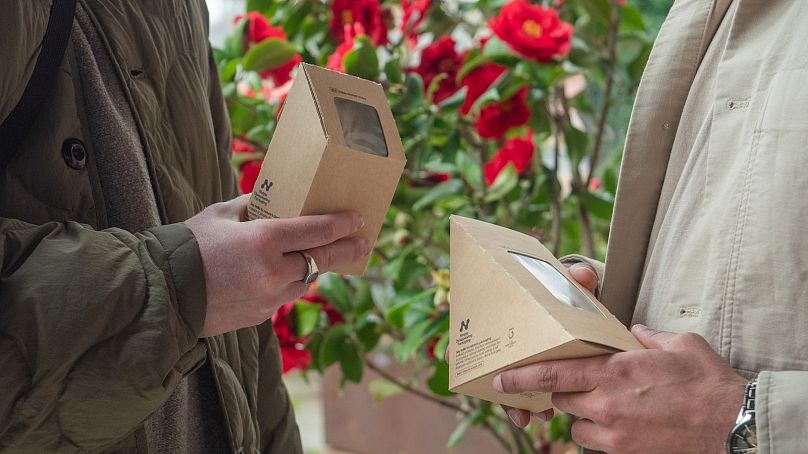
If you’re lucky enough to be seeing Beyoncé at Tottenham Hotspur stadium in London this month, chances are your concert snacks will come in a container made out of seaweed.
Notpla, the company which makes seaweed-based packaging to replace single-use plastics, has gone from strength to strength since winning the Earthshot Prize in 2022, bagging a prize of €1 million in the global environmental award created by the UK’s Prince William.
The venture started with its two French and Spanish founders, Pierre Paslier and Rodrigo Garcia Gonzalez, experimenting in their student kitchen while at Imperial College London. Now, Notpla has replaced more than 21 million items of single-use plastic across Europe, and is aiming to displace 1 billion units by 2030.
In order to make a real dent in the insidious issue of plastic pollution, the ‘disappearing packaging’ solution is being rolled out in new venues and fashioned into new shapes and sizes. We caught up with chief revenue officer Lise Honsinger, Notpla’s first employee in 2017, to find out more.
Notpla and fronds: The spread of a seaweed solution
Notpla’s prototype was an edible water capsule called Ooho. It garnered viral interest in 2017, which Honsinger partly attributes to a “zeitgeist” of plastic pollution awareness.
The start-up partnered with Lucozade to replace 36,000 plastic bottles at the London Marathon in 2019. Then COVID hit, events stopped, and the company pivoted to focus on seaweed coatings for food packaging which make takeaway boxes compostable like fruit peel.
In partnership with Just Eat, Notpla’s packaging was used at the UEFA Women’s Final at Wembley Stadium, London in 2022. From seven types of folded carton board boxes that year, it has grown into a catalogue of over 50 different designs.

Imagine pretty much any food packaging you’d pick up from a street food van - burger clam shells, chip trays and forks, churros scoops - and there’s a seaweed-coated alternative.
There is a purity to Notpla’s vision - which clearly impressed the Earthshot Prize judges. Winning in the ‘Build a Waste-free World’ category further “unlocked credibility”, as Hosinger puts it.
“We're not going for the easiest win,” she says. “We're not going to mix our product with a bit of plastic to make a semi-natural product because that's a bit easier. We're going to go for it even if it's the hardest thing, to make sure it's truly natural.”
Seaweed packaging is coming to stadiums, offices and museums
Notpla products are now used at major stadiums and venues in the UK, including the Kia Oval, The Principality, Tottenham Hotspurs, Aston Villa, The Aviva, Twickenham and the ExCel Centre.
The Johan Cruijff Arena in the Netherlands is on board too, and Levy - part of the Compass Group catering company which Notpla works with - has just won a contract with stadiums in Germany. That’s all part of a “step change” to spread across Europe and the US, Honsinger says.
The aim is to make the switch as friction-free as possible, and Notpla products can fit into whatever waste stream the stadium already uses, from composting to recycling or general waste.
Meanwhile, IKEA has just rolled out Notpla’s seaweed-based packaging in its new Oxford Street London restaurant.
And the company is launching a new deli range, featuring plastic-free windows so people can see their sandwiches before buying. Honsinger hopes this will help Notpla branch out into office catering and museums, where that sneak peek is important.

“We absolutely want this solution to be everywhere. We don’t want to be a niche packaging brand,” she says.
The plan is to go upstream over the next few years - providing coatings to board manufacturers, for example, rather than selling boxes to box buyers. Ultimately, Honsinger wants Notpla to become a household name, in the realm of Tetra Pak or Gore-Tex.
“Everyone will know, if I've got a packaging that's Notpla, it's not got plastic in it, it's not got forever chemicals, it's not going to give me cancer - because I think the world’s woken up to the health consequences of plastics as well.”
New frontiers for natural, plastic-free packaging
With seaweed extracts from France, Spain (ROKO) and South America, Notpla is fashioning its wonder ingredient into various new shapes and sizes.
The scientists are working on creating cold and hot cups, for example, while Notpla continues to develop its existing solutions - like speeding up the manufacture of Oohos.
But there are limits to this R&D. “The reason plastic is everywhere is because it's not natural,” Honsinger explains; it forms a complete barrier to oxygen, water, and grease. Seaweed is never going to be the same as plastics, she says, and that’s a good thing.
“You've got to remember the reason why it hasn't got as extreme properties as plastic is the reason it will break down in nature.”
Notpla created the Natural Polymers Groups with some of its competitors last year. It bears the distinction of being the only plastic-free alternative to meet the EU Single Use Plastics Directive (SUPD), according to the Dutch government, which carried out extensive testing in 2023.
With regulations on single-use plastics and forever chemicals (PFAS) tightening up, the future is bright for alternatives like Notpla.
Are plastics companies aware of their seaweed competitor yet?
“I think mostly at the moment we're not big enough to scare them,” says Hosinger. “But I think they know it's coming.”







